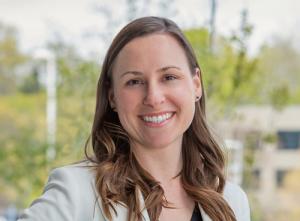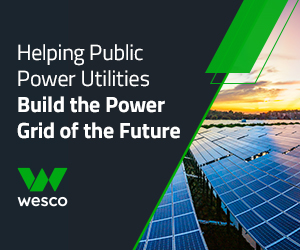Burns & McDonnell
Amanda Olson is Engineering Director, Transmission & Distribution Group, at Burns & McDonnell.
The pandemic didn't stop these luminaries from the energy and utilities space from innovating in all types of technologies. Ninety individuals sprang into action, creating new tools or strategies to better serve their colleagues and communities. This year, PUF is celebrating these ninety Under Forties.

PUF's Steve Mitnick: You're engineering director for the Transmission & Distribution group at Burns & McDonnell. What do you do?
Amanda Olson: I came into this role in January. It's a new role within our organization in Kansas City and I'm the first in it, which is slightly intimidating.
As engineering director, I'm responsible for overseeing the support and development of our people technically and making sure we have the design tools and resources to effectively engineer projects for our clients.
What led me to this role was not necessarily everything I did within my official positions up to this point, but all of the side gigs I find myself taking on along the way.
I'm extremely involved with CIGRÉ. It's an organization much like IEEE but concentrates on providing technical brochures and is internationally focused. It has a Next Generation Network group geared toward bringing a more diverse pool of participants to CIGRÉ.
I became involved with NGN around 2012 by holding several positions throughout the organization. Taking on additional tasks and building that network externally was one of the things I did that prepared me for my role as engineering director.
PUF: What do you do at CIGRÉ meetings?
Amanda Olson: There are a couple of ways I am involved with CIGRÉ. Organizationally, with the NGN and Women in Energy come opportunities to engage more diverse candidates within the organization and plan meaningful events.
The other side is the technical, and that's what we want to funnel everybody to. The opportunities on the organizational operations are a means to get people better integrated technically into working groups. A working group for CIGRÉ is made up of participants from across the globe.
That's where the work is done and you get international collaboration on important topics relevant in the power industry, where they compile best practices that are published on our website for members to download and reference when they come across situations that might be relevant.
Most of them are extremely technical, but one that I'm on currently, which applies to the role I'm in now, is knowledge transfer. How do you transfer knowledge from people later in their career to those who are just entering, in an effective way that allows them to retain that knowledge and apply it throughout their careers?
PUF: Why was CIGRÉ such a help in your work at Burns & McDonnell?
Amanda Olson: Historically, it has provided me with a completely separate network of professionals within the power industry, as well as unique experiences that complimented the experience I've had working at Burns & McDonnell.
Here I had the opportunity to lead project teams, supporting work for clients across the country. Within CIGRÉ, coordinated still across the country and internationally, but leading a team to focus on different aspects, not necessarily just on project deliverables. How do we benefit CIGRÉ by bringing people with diverse backgrounds into this organization? What sort of events can we host? How do we engage those members?
It allowed me to think differently than I had to with the work I did here. It was a complementary, but almost separate track that gave me more experiences.
PUF: As a female, how have you been able to be successful and effective at Burns & McDonnell, since engineering has traditionally been a field full of males?
Amanda Olson: As a student, I was in the minority in many of my classes, but at that point in my life, I was somewhat naive. I didn't see myself as different, even though sometimes I was the only female in my class. Entering the workforce, I carried that same mindset, but was able to educate myself that there are hurdles for women in engineering, and in any field for that matter, when you're in the minority.
I tried to do my best on every project. I tried to speak up when I had opinions and sometimes put myself out of my comfort zone. I made a point to apply for opportunities, even if I didn't feel qualified, because there are statistics on this being helpful for anyone.
There's a flip side where you have advocates along the way and people that you look up to. We've got some amazing women in Burns & McDonnell that I've always looked up to.
Meghan Calabro is one of them. She is the managing director of our distribution modernization group. She sets a good example and is a leadership role model within the organization. My current and past supervisors as well — I have been lucky to work with such uplifting people who provide great advice, feedback, and encouragement, but are also good people. We have leadership that is supportive and advocates for you.
PUF: What do you find most rewarding about what you do?
Amanda Olson: The people. We work on a lot of amazing projects and solve challenging problems, especially in today's environment with the infrastructure investments on the power grid. I love the projects, but it's the people that have the biggest impact on why I love my job.
Both within Burns & McDonnell and the other organizations I'm part of, I'm working with people that are excited about making these changes that will have a positive impact on our future. There's an energy you can almost feel when you're working with people excited about what they are doing. Even now, when everything's gone virtual, you can still feel the energy and excitement people have when they get to work on some of these projects.
2021 Fortnightly Under Forty conversations:
- Shivani Sidhar, Sempra Energy
- Devin James, Edison Electric Institute
- Jace Carlock, Entergy
- John Siefert, Electric Power Research Institute
- Amanda Olson, Burns & McDonnell
- Ali Mohammed, New York Power Authority
- Justin Segall, Uplight
- Brandon Pixley, CPS Energy
- Stephanie Crawford, NRECA
- Kristjana Kellgren, Alberta Utilities Commission
- Flavia Lenzi, ENGIE Italia
- Patrick Wruck, British Columbia UC
- Müge Özerten, Hitachi ABB Power Grids
- Aki Marceau, Hawaiian Electric



